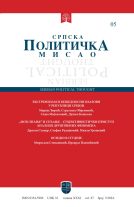- Home page
- Researchers
- Jovica Pavlović
Jovica Pavlović
Institute for European Studies, Belgrade

ENERGY TRANSITION IN INNOVATIVE PUBLIC POLICIES IN SERBIA AND THE REGION – CHALLENGES OF DECENTRALIZATION AND DEMETROPOLIZATION***
The Republic of Serbia, as a country with the status of a candidate for membership in the European Union, opened the 15th and 27th negotiation chapters (which deal with energy and environmental protection) at the end of 2021. On the way to successfully closing the mentioned chapters, Serbia can rely on the experiences of neighbouring EU member states; Croatia, Hungary, Romania and Bulgaria. Therefore, the primary goal of this paper is to carry out a comparative analysis of the energy transition policies implemented in those countries, while – in order to fulfil the secondary goal – it also strives to consider ways in which these policies could be implemented in Serbia itself, primarily through cross-border inter-municipal cooperation with the mentioned countries. In this respect, the paper concentrates on bottom-up energy transition policies, since recent research (dealing with cross-border cooperation in the field of energy transition and ecology) indicates that there is a need to strengthen inter-municipal cooperation, that is, the need for greater decentralization and demetropolisation. In order to achieve the stated goals, an interdisciplinary approach is applied; one which relies on the methodology of legal, political and economic sciences. On the one hand, local energy transition policies implemented in neighbouring EU member states are subjected to SWOT analysis, while, on the other hand, potential models of experience exchange between local self-governments and possible ways of cross-border inter-municipal cooperation on joint projects are critically considered. The results indicate that there is large potential when it comes to cross-border inter-municipal cooperation in the form of achieving goals in the field of energy transition and environmental protection, but this potential remains unutilised. An obstacle in this regard is the centralized state apparatus of the Republic of Serbia and certain neighbouring EU members, while the Romanian example can serve as a roadmap for overcoming this problem.

THE EVOLUTION OF ENVIRONMENTAL PARTIES AND GREEN POLITICAL MOVEMENTS IN THE REPUBLIC OF SERBIA
The following work aims to provide an analytical overview of the development of environmental political parties in Serbia. By relying on the methods of process tracing, as well as on Lipset and Rokkan’s and other relevant theories of sociopolitical cleavages, the work examines how political events that occurred in Serbia over the last three decades led to the formation of eco-activist movements and parties, especially within the last several years. More specifically, the fulfillment of the primary aim requires – but is not limited to – an analysis of how green parties and environmental movements formed, shaped, and changed their strategies over time, especially when it comes to their activity planning, decision-making, support-mobilizing, and networking (including participation in broader political coalitions). The study not only includes genuine eco-activist organizations but also focuses on how (and why) decoy and phantom green parties developed and evolved in relation to the activities of their authentic counterparts. The paper concludes that environmental issues became increasingly more important in Serbia during the previous decade, with a more prominent arrival of foreign industry and foreign investors, which consequentially caused a noticeable deterioration of the environment (quality of air in particular). This opened a window of opportunity for opposing movements and parties to attract widespread support – and develop their strategies – based on and in relation to this previously less important topic.

REPORTING ON SECESSION IN SERBIAN MEDIA: THE CASES OF SCOTLAND AND CATALONIA
This research relies on instrumentalist explanatory theories of secession and the media framing theory in order to examine discursive praxis through which Serbian journalists report on independence referendums being held in West Europe, with primary focus being dedicated to the case of Spain and the United Kingdom. The aim of the research is to investigate whether a comparison can be drawn between media discourse on the secession of Kosovo and interpretative patterns that are utilized when Serbian media report on attempts of Catalonia and Scotland secession. The goal is to conclude whether Serbian journalists produce subjective or objective and analytical articles when writing about the sensitive subject of separatism outside of the domestic political context. The sample is based on the Internet archive of ten newspapers and broadcasting agencies which substantively covered the issue of Scotland’s and Catalonia’s right to self-determination during the respective referendums. The results go against the initial hypothesis which predicted that discursive frames used in describing the secession of Kosovo would completely spill over to reports on West European cases, but confirm the lack of adequate analytical approach to secessionism in Serbian media. We found several equal interpretative patterns in both observed media discourses - on Catalonia and Scotland secession attempts, on the one, and Kosovo secession, on the second hand. Those are: resistance to secession and other secessionist activities; support for central government anti-secessionist policies, and the European Union responsibility. Two key differences regarding previously framed discourse on Kosovo secession are: absence of secessionist leaders humiliation and more visible discourse of Serbian responsibility. When it comes to Kosovo and Catalonia secessionism comparation, the media mostly take over and reproduce the Serbian political mainstream agenda and interpretation. This is the way to instrumentalize this media topic in order to draw attention to Kosovo's problem, while supporting Serbian political leaders and disputing the European Union legitimacy (since it has supported Kosovo's secession). The mainstream media discourse has been challenged having in mind daily Danas, which frames the topics of secession by diversifying sources and subjects of reporting, using a larger share of analytical papers, and opening the perspective of Serbian political responsibility for secession of Kosovo. But this media discourse polarization has one broader and dominant (pro-government) and one minor and marginalized (pro-opposition) pole.
